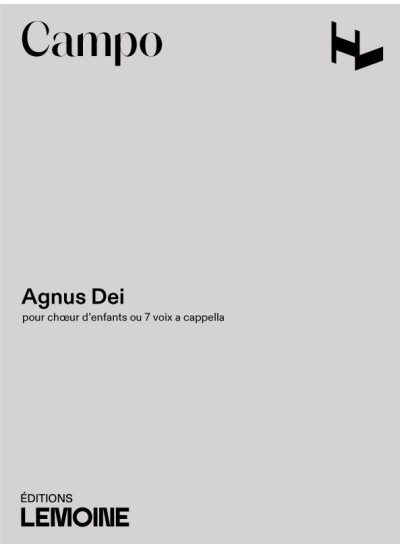
Agnus Dei
Solo voices or chorus
Régis Campo was born in Marseilles in 1968 and took composition lessons with Georges Boeuf and Jacques Charpentier before enrolling at the Paris Conservatory, where he continued his studies with Alain Bancquart and Gérard Grisey, finishing with the first prize in composition in 1995. In 1992 he also studied composition with Edison Denisov who deemed him "one of the most gifted of his generation". His writing style, which is deliberately playful and energetic, diverges from the mainstream of the late-20th century, putting the accent on melodic invention and lively tempi. He counts Stravinsky, Mozart and Rameau as his chief influences, alongside Messiaen, Lutoslawski and Mahler. From 1999 to 2001, he was a resident at the Villa Médicis, home of the Académie de France in Rome. Régis Campo teaches composition at the National Conservatory of the Marseilles Region. He is composer-in-residence for the 2004-5 season with the Pau Orchestra, the Parvis de Tarbes and its conservatory. Among his numerous awards are the Gaudeamus Prize (1996), the Young Composers Special Prize (1996), the Dutilleux Competition (1996), as well as the Hervé Dugardin and Pierre Cardin prizes (1999).
Today, he is regularly invited to join the juries of international competitions.
After the premier of Happy Birthday in 2003 with Ensemble Orchestral de Paris and John Nelson, in 2008 the British soprano Felicity Lott premiered his Bestiaire d'après Apollinaire with the Orchestre National de France conducted by Alain Altinoglu. 2009 opens with the premier of his opera Les Quatre jumelles, after the eponymous play by Copi. Ensemble TM+ and l'Arcal will tour the work in various cities (Nanterre, Reims, Beynes, Macon, Paris, Valenciennes...).
Thierry Vagne
Régis Campo - Musique de l'émerveillement
Aedam Musicae (AEM210), 2018
Régis Campo was born in Marseilles in 1968 and took composition lessons with Georges Boeuf and Jacques Charpentier before enrolling at the Paris Conservatory, where he continued his studies with Alain Bancquart and Gérard Grisey, finishing with the first prize in composition in 1995. In 1992 he also studied composition with Edison Denisov who deemed him "one of the most gifted of his generation". His writing style, which is deliberately playful and energetic, diverges from the mainstream...
Thierry Vagne
Régis Campo - Musique de l'émerveillement
Aedam Musicae (AEM210), 2018
- quaiouestregiscampo.blogspot.com
- www.cdmc.asso.fr
- Emission "Ce n'est pas tout" (musiq3) du 15/02/2019: www.rtbf.be
- La Lettre du Musicien: Les coulisses de la création #2 : Régis Campo